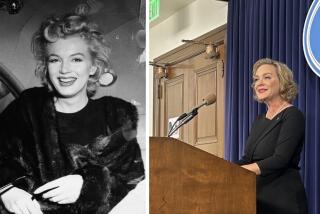Widow Fights for ‘Piece of Heaven’ in Park
ROCKY MOUNTAIN NATIONAL PARK, Colo. -- When Coors wanted to film a commercial that captured the heart and soul of the Rockies, the beer company came to Betty Dick’s backyard.
It’s easy to see why. The Colorado River meanders through a rippling meadow under the shadow of two 12,000-foot peaks. Dick, 83, has spent the last 25 summers here, hosting cookouts and family reunions, watching moose and elk from her front porch and soaking up the glory that is Rocky Mountain National Park.
But now the National Park Service wants Dick to move out. The lease that allowed Dick to live on 23 acres in one of the country’s most popular national parks expired July 16.
Dick isn’t budging. Arguing that the Park Service fleeced her and her late husband when it bought their ranch in the 1970s, Dick has already gotten the U.S. House of Representatives to pass a bill that would allow her to stay on the land for the rest of her life. She appeared before a Senate subcommittee in Washington on Thursday asking senators to do the same.
“What is the hang-up letting someone who is 83 years old stay for the rest of her lifetime?” Dick said in an interview. “If I was 40, or even 60, I wouldn’t fight it.”
The Park Service contends that such a move would be the first time Congress allowed one of the many people who lease land in a national park to stay in a residence past the end of the lease, and would set a troubling precedent.
The nation’s park system was partly created by buying private land -- ranches, farms and vacation homes -- and allowing the original owners to stay for a time before the land became open for public use. So far, the Park Service said, 473 families have vacated parkland when their leases expired. There are 150 families still living on parkland -- including Dick and two others in her area of Rocky Mountain National Park. In rare instances, the Park Service has evicted tenants.
“There have been people who have given up whole ways of life -- ranching operations and family farms -- to create the national park system,” said Parks Service spokeswoman Karen Breslin. “What is the fairness of giving Mrs. Dick this opportunity [to stay] when other people didn’t have it?”
Dick argues that the tangled, decades-old legal battle that led to the signing of the lease is what differentiates her from other tenants of the park system.
In the 1960s, Fred Dick, president of a bank in Bloomington, Ill., and his first wife bought 66 acres of an old homestead on the western side of Colorado’s Front Range and used it as a summer home. At the time, the national park boundary was several miles to the east, and the Kawuneeche Valley was privately owned, divided between several old ranches and homesteads.
Fred Dick divorced his first wife and married Betty in 1978. In the divorce, the ex-wife got the homestead land, but Fred Dick retained right of first refusal if it was ever sold.
It was a good time to be holding a piece of property in the valley. Congress had passed a bill to expand Rocky Mountain National Park, and the Park Service was buying up the private land in the valley. The government bought the property from his ex-wife in 1977 for $214,000 -- without offering Fred Dick the right of first refusal.
He sued to block the sale, and a three-year battle ensued. Worn out from the bitter divorce, Fred Dick took his new wife to the land in the summer of 1978 and asked her if it was worth fighting for.
“I said ‘Fred, you’d be crazy to stop fighting for this, it’s just a little piece of heaven,’ ” Betty Dick recalled.
Two years later, the government reached a settlement with the Dicks. Betty Dick said the terms had been for the two of them to give up two-thirds of the land and to be able to stay on the remaining third for the rest of their lives. But when the papers arrived in the mail, they specified the term of the lease as being 25 years.
Exhausted, and presuming they wouldn’t live another quarter of a century, the Dicks signed. Fred Dick died in 1992 but Betty remained on the land during the summers.
She hosts her children, 10 grandchildren and two great-grandchildren and has erected a treehouse and a playhouse for them. Betty Dick also throws regular parties for the Rocky Mountain Theater Company and other community groups from the towns just outside the park.
“They say they bought this property for the American people,” Dick said of the Parks Service. “I defy them to bring more people onto this property than I have. They should just see my summer calendar.”
It was at one such gathering last summer, with about 80 people on folding chairs under the stars, that a guest urged Dick to stay put and fight when her lease expired in 2005.
The widow hired a lawyer and got her congressman, Rep. Mark Udall (D-Colo.) to introduce a bill in the House that would allow her to remain on the property for the rest of her life. It passed unanimously this month. Since then, the Parks Service has offered two compromises.
First it offered to allow Dick to retain the three acres of land surrounding her house for two years, at a rent of $1,000 a month. Dick rejected the proposal.
Last week the service proposed letting Dick stay on that parcel for the rest of her life. But Dick told the Senate’s National Parks subcommittee Thursday that she was still seeking a law that would allow her to hold on to all of the property.
Rick Frost, a spokesman for the Parks Service, said the agency was trying to be accommodating but also stick to its goal. “We’re accomplishing what we really want to accomplish,” Frost said, “which is getting the land back into the hands of the American people.”
Dick said in an interview that local park staff had been sympathetic and assured her that she would be able to remain on the land until at least October, when snow begins to fall and Dick returns to her winter home in an Arizona retirement community.
The widow also has champions in the towns outside the park.
Judy Burke, mayor of the gateway town of Grand Lake, points out that Dick’s land is “just a small portion” of a 475,000-acre park. And, she asks: “What would it hurt to let the little ol’ lady stay?”
More to Read
Sign up for Essential California
The most important California stories and recommendations in your inbox every morning.
You may occasionally receive promotional content from the Los Angeles Times.










